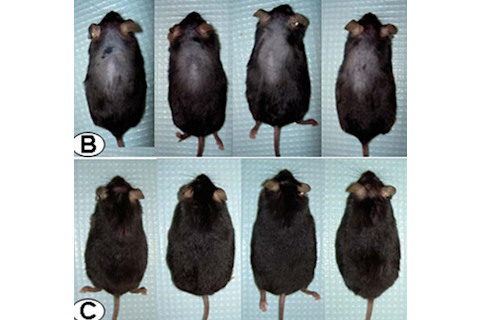
It was a stroke of serendipity that may one day help those who hide under comb overs or wear wigs: scientists studying how mice bowels react to a stress-reducing chemical have inadvertently discovered a cure to baldness. But unfortunately, it looks like this cure won't apply to genetic baldness, which is by far the main cause of most hairless pates. Still, researchers hope the lucky find will eventually be used to battle at least some of the bare heads of humans. The story begins with mice that were genetically modified to produce too much corticotrophin-releasing factor, or CRF--a type of stress hormone. Normally, as these stressed-out rodents age, their backs lose hair. But a group of researchers from the Veterans Administration and the University of California at Los Angeles didn't care about hair, they just wanted to study the effects of a chemical on the modified mice.
Researchers at the Salk Institute developed a peptide called “astressin-B”, which blocks the action of CRF, and the teams injected the peptide into the bald mice. They weren’t thinking about baldness at all — they wanted to test whether the astressin had any impact on the mice’s gastrointestinal tracts. The first injection did nothing, so the team gave the mice additional injections over five days, and then measured the effects on the newly de-stressed mice’s colons. [Popular Science]
With most of the experiment done, the researchers forgot about the mice for three months. Then they returned for some follow-up tests:
Dr. Million Mulugeta, co-director of the preclinical stress biology program at U.C.L.A., said he looked inside the cage and at first wondered why the bald mice weren’t there. “I asked my colleague, ‘How come these mice aren’t distinguishable from the others?’” he said. “We went back to our data log, and we realized all the mice had grown hair. It was a totally unexpected finding.” [New York Times]
So they repeated the experiment a number of times by giving the genetically modified and balding mice small doses of the peptide over the course of five days; each time, their hair returned within a matter of weeks. And when they administered the peptide to mice whose hair hadn't yet fallen out, they discovered that these mice didn't go bald. Four months after treatment the mice were still as hairy as ever. The research was just published in the journal PLoS One, and the scientists involved are excited about the implications:
“This could open new venues to treat hair loss in humans through the modulation of the stress hormone receptors, particularly hair loss related to chronic stress and aging,” said Million Mulugeta, an adjunct professor of medicine at the David Geffen School of Medicine at UCLA. [Popular Science]
Much still needs to be learned about this particular peptide:
The mechanism by which the peptide triggered hair growth isn’t known, Dr. Mulugeta said. The agent appears to be acting on stress hormone receptors in the skin and near, or within, the hair follicle. “The hair follicle in these mice is inactive,’’ he said. “Something has turned on that cycle to put it back into an active phase, a hair-growing phase.’’ [New York Times]
Scientists also note that, given different growth cycles, human hair doesn't grow in the same manner as mouse hair. So University of Pennsylvania dermatologist George Cotsarelis is cautious about making the leap from mice to men: “It’s difficult to say that it’s going to lead to a new treatment,’’ he told the New York Times. He also added that this treatment probably wouldn't be effective against genetic baldness, which leaves many in a lurch because male pattern baldness--the most common variety of hair loss--is closely tied to genetics. But if this research does translate into a human treatment for hair loss, there may be a bonus: the peptide also appears to alter pigment, meaning that it could be used to stop those new hairs from graying. Related Content: 80beats: Hairless Dogs Give up the Genetic Secret of Their Bald Glory 80beats: Study: How Suspects’ DNA Traces Can Reveal Their Hair Color 80beats: Stress–-the Genetic Kind–-Really Can Make Hair Go Gray Discoblog: Balding Penguin Gets a Neoprene Toupee DISCOVER: Bald Men: This Mouse Is for YouImage: UCLA / VA













